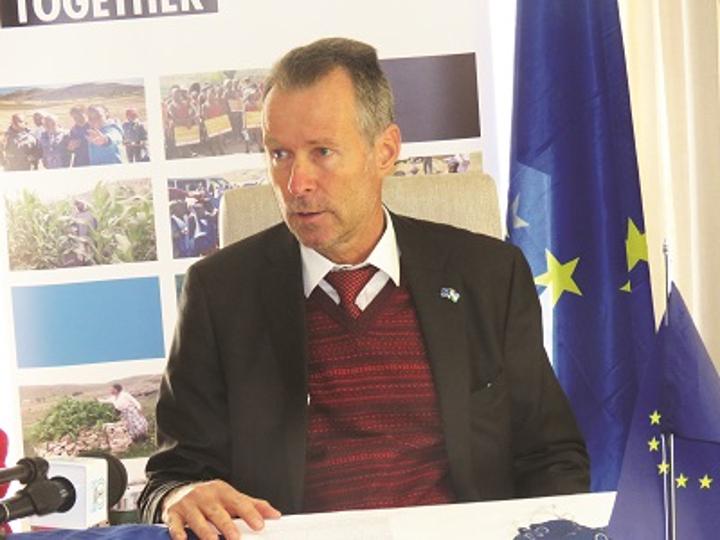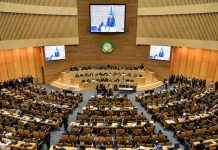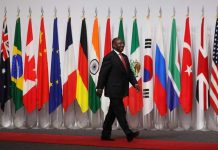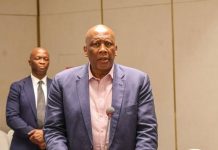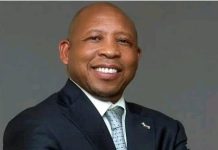Africa-Press – Lesotho. The European Union (EU) Head of Delegation to Lesotho Dr Christian Manahl had recently stated that his assignment is coming to an end this month; our reporter Thoboloko Ntšonyane caught
up with him to reflect on his experience and journey in Lesotho. Below is an excerpt of the interview. As EU Ambassador to Lesotho, how has your journey been for the past four years?
It has been an exciting and eventful assignment, a very enriching experience. I found Lesotho much more complex than what one would imagine for a nation of two
million people, most of whom speak the same language. It is a country that, unlike others in the region, has authentically preserved its traditions, and
this gives it a head-start in the process of development and modernisation, although it has been grappling with political instability, poverty and inequality.
What are some of the EU’s funded projects which you coordinate and are you comfortable with the impact they are making in the communities and those of
national scale? For some time, the European Union, including the European Investment Bank (EIB), have supported water supply for the lowlands. The EIB provided funding
for the Metolong dam, and the European Commission, through the European Development Fund, has financed infrastructure for bulk water in several districts.
Currently, the focus is on the southern districts. We work in complementarity with the World Bank, which provides support for an extension of the infrastructure in the north-western areas.
The EU has also mobilised funding for an innovative project to protect Lesotho’s wetlands, which are not only crucial for rural livelihoods and livestock, but also have a regional importance as they preserve the capacity to
provide water for Gauteng province, the economic powerhouse of southern Africa. And perhaps there will be an opportunity for future exports of water to
Botswana. The project, called ReNoka or Integrated Catchment Management, cuts across several sectors – water management, protection of grazing lands, environment, tourism – and it gives particular attention to the rural areas,
which have the highest level of poverty. It also aims at mitigating and adapting to the effects of Climate Change. Another project aiming at assisting rural
areas is a feasibility study on the wool and mohair sector; it looks into the possibility of establishing a testing laboratory and explores options for
processing wool and mohair in Lesotho, rather than only selling the raw product. This is a sector of great importance for Lesotho and it may open up new opportunities to exploit value chains and to create new employment.
Two other important programmes were the upgrading and expanding of the National Information System for Social Assistance (NISSA), coordinated by the Ministry
of Social Development, in cooperation with United Nations International Children’s Emergency Fund (UNICEF), and our financial support for the reforms dialogue and the National Reforms Authority (NRA).
NISSA has made a swift response to the COVID-19 crisis possible, by scaling up and expanding social grants for people most affected by the lockdowns. The EU has exceptionally
mobilised €5.53 million (about M100 million) to complement social grants provided by the Government. The reforms are crucial in order to stabilize the governance system and we therefore supported several National Leaders Fora,
the popular consultations (pitsos) and the Second Plenary of the Multi-Stakeholder National Dialogue. We are now supporting the NRA and we hope that critical reforms will be completed before the next elections, so that the
incoming Government after the elections in 2022 starts on solid constitutional and political foundations. How does the EU plan to sustain its roles which are diplomacy, human rights promotion, trade, development and
humanitarian assistance among others and what other projects is the EU looking to support? The EU is a union of 27 European member states, with several others planning to
join. It has achieved a high degree of integration while maintaining the sovereignty and identity of each individual nation, based on the principles of
democracy, human rights, political liberties, and solidarity among each other and within societies. In our highly interconnected world, these fundamental
values cannot be effectively protected without international cooperation. This is why we are reaching out to like-minded countries, not only at governmental
level, but also to civil society. At a time when democracy is competing with authoritarian regimes and new forms of populism, we need allies in the world
which support our positions in the United Nations and our efforts to maintain a rules-based international system, both in peace and security and in international
trade. We also need allies to contain climate change and to address other environmental challenges, and of course to fight pandemics like COVID-19. Not all countries share all our values and objectives, so we
have to work selectively with countries around the world. For these reasons, the EU’s international relations are not limited to development cooperation and
the fight against poverty, they also encompass political, commercial, environmental and cultural aspects. We have a network of about 140 Delegations around the world, including permanent representations to the United Nations, as
well as several security missions, which often work in cooperation with regional organisations like the African Union. What opportunities do you see for
Lesotho to tap into the EU bloc and what low hanging fruits are there for the country to exploit? The most important opportunity is the Economic Partnership Agreement for
southern African countries. It offers Lesotho (and the other countries which have signed it) duty-free and quota-free access to the European market for most
products. So far, the overwhelming majority of Lesotho’s exports to the EU, in financial value, have been raw diamonds. But we believe there is considerable
potential for other sectors, notably textiles. Wool and mohair as well as medical cannabis are also promising export products, and first inroads have already been made: A local producer of medical cannabis was the first one from
Africa to obtain a licence to export to the European Union; and a first batch of mohair was last year sent to Bulgaria, one of our member states. The legal
framework exists and it is lucrative, but now it is up to businesspeople to seize this opportunity and to explore profitable markets. The EU Delegation,
together with the trade sections of Member States’ Embassies in Pretoria, can help facilitate contacts. The other opportunity for Lesotho is of course the EU’s development funds,
which amounted to a total of about €185 million (about M3.228 billion) over the past five years. This includes financing from the European Development Fund
(EDF), from the EU budget (including humanitarian assistance), and from
Lesotho’s allocation of multilateral contributions like the Global Fund to fight AIDS, Tuberculosis and Malaria, or COVAX. Lesotho has taken advantage of
this opportunity, but lack of government stability – including at least seven reshuffles in the current legislative period – have slowed down progress on
programme implementation, which means that eventually Lesotho receives less money than what would otherwise be possible. The EU is also one of the main contributors to the International Monetary Fund
(IMF) and the latter has offered to enter into a programme with Lesotho, if so
requested by the Government, with the aim to restore macro-economic stability. It would, however, require the Government’s willingness to go through a period
of structural adjustments. What is the approach for governance that the EU endorses and do you think Lesotho is living up to that? The European Union is founded on the values of respect for human dignity,
freedom, democracy, equality, the rule of law, solidarity and respect for human rights, as defined in Article 2 of the Treaty. We are pursuing these values not
only internally but also in our international relations, as mentioned before. Lesotho is a democracy, it has enjoyed free and fair elections – and peaceful
changes of Government through elections – and it has a vibrant civil society which is respected by the Government. Lesotho also has a very outspoken media, and
people enjoy freedom of expression, including through social media. Sadly, this cannot be said of too many countries on the African continent. Lesotho also has
governance challenges, notably political instability and deficiencies in service delivery, but all countries have their own challenges and what has impressed me here is the sincerity of public debate about these shortcomings.
The national reforms are a major collective effort to address these shortcomings comprehensively. If properly implemented in accordance with the outcome of the Second Plenary of the Multi-Stakeholder National Dialogue, these
reforms can lay the foundations for a more stable and peaceful future, and this will help lift the country out of pervasive poverty and lead to sustainable
development and prosperity. Which critical areas of governance do you think the country needs to improve and do better in? Governance areas where there is room for improvement are human rights, in
particular compliance by security forces and protection of vulnerable groups, public financial management, and the efficiency of civil service. These challenges are widely recognised, including in the National Strategic
Development Plan (NSDP II), and strategies to tackle them have been formulated. It is time to put the stated good intentions into practice. The EU has been actively involved from
inception of the ongoing national reforms for the “Lesotho we want”, through financial assistance and otherwise, reflecting back on this journey, in 2017 when you had just arrived, would you say the progress has been commendable
and what ingredients are needed to ensure their success? Yes, good progress has been made, notably by completing the National Dialogue which included an unprecedented popular consultation in all corners of the
Kingdom. A blueprint for the reforms exists and an oversight body for its implementation, the NRA, has been established. COVID-19 and resource challenges
have temporarily slowed down progress on the implementation, but the process is now gaining cruising speed. I am convinced that critical reforms for government
stability, notably those concerning the parliamentary system, separation of powers, and other Constitutional issues, can be completed before the next elections.
All stakeholders should focus on achieving this in time. I am also encouraged by the Stakeholder Forum on sustainable peace, political stability, national unity, reconciliation and social justice, which took place
[last] month. Discussions were agitated and controversial, which could be
expected because people feel strongly about these issues, in particular about transitional justice. But it is the beginning of an important social debate
that needs to accompany the legislative process, so that the reforms enjoy popular support. What is the most important lesson the country can draw from the reforms exercise?
Perhaps the most important lesson is that while parliamentary democracy is a competitive system, it also relies on the ability of the political actors and
of political parties to cooperate. No system can be reformed if the stakeholders relentlessly fight each other. In a democracy, there is a time for (electoral) competition, and there is a time for cooperation.
The right balance is important. In your speech at the national stakeholders consultation forum towards “Sustainable Peace, National Unity and Reconciliation” under the
auspices of the National Reforms Authority (NRA), you intimated that “legislation alone will not reform minds and hearts”, what did you mean by that? Please expound on that.
There is a lot of distrust among Lesotho’s politicians, which is a result of the many violent episodes that the country has experienced since Independence,
but also a consequence of the many splits of political parties. Many politicians have worked together at one point, then fell out with each other and formed new parties.
And when friends fall out with each other, bitter resentment remains and sometimes competition degenerates into violence. Legislation can help prevent the worst excesses, but it does not by itself reform the minds
and hearts of the people and it does not overcome the prevailing suspicions or address legitimate grievances. Only dialogue, disclosure, forgiveness and
mutual understanding can achieve that. The legislative reforms process has to be accompanied by a social process, and a mechanism of transitional justice, as
proposed by the Second Plenary, can facilitate it. Luckily the Stakeholder Forum has created a broad consensus on the need for such a mechanism, even if
its mandate, scope and structure still need to be defined. The forum has produced a wealth of ideas for that and I trust the Parliament and the NRA will
take these into account. Your message of support to the nation and its leadership as your assignment is coming to an end! Lesotho is a proud nation which is undergoing a difficult process of
modernisation and adaptation to an interconnected, digitalised, and environmentally fragile world. It should draw on its traditions but also not be shy to adopt new ways that help overcome the country’s challenges.
Lesotho’s youth have already done so by enthusiastically embracing social media, which has had a profound impact on political and social dynamics. We are living in a
fast-changing world; tradition can be a compass to help us navigate these challenging times, but political and social leaders still have to steer the ship.
Also, inter-connectedness means that we share the same problems and challenges, and we all have to work together to resolve them – from international security to climate change to poverty alleviation. This is the raison d’être of diplomacy!

